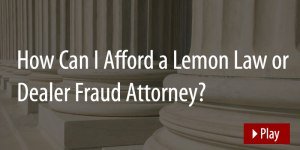Hyundai Lemon Law Attorney in San Diego
Hyundai is a very popular South Korean auto manufacturer, and it has become one of the major players in the United States auto market. They have been selling over a whopping 725,000 vehicles in the United States in 2014. Hyundai also boasts one of the most extensive vehicle warranties on the market, namely 10-year/100,000 miles warranty. Given the fact that the lemon law is in essence a warranty law, this will provide the consumers who have purchased or leased a Hyundai protection up to 10-year/100,000 mark. This means, that in the event that you start having issues at 90,000 miles, you potentially would still have a Hyundai lemon law claim.
Is Your Hyundai Vehicle a Lemon?
Each state in the United States provides protection to the vehicle owners under the state’s lemon law. This usually differs from state to state. Moreover, Hyundai vehicles are protected under the Magnuson-Mass Warranty Act. It is the federal lemon law, and if your Hyundai is leased or purchased, and it has been to an authorized dealership several times for multiple repair attempts, it is very much likely that your Hyundai would qualify for the relief under the state law or the Federal law.
Quite often the consumers bring their vehicle for a repair at the repair shop, and this vehicle is either not verified or it is duplicated. Because of this issue, they do not believe that they have a lemon law claim. Generally, the lemon law provides that you simply need to give the manufacturer, in our case Hyundai an opportunity to repair your vehicle. This will qualify you as having given Hyundai with an opportunity to repair the vehicle. In case they are unable or chose not to repair it during your visit, it isn’t an issue under the lemon law.
What Issues with Hyundai Qualify Under the Lemon Law?
The lemon law claims can be brought on any purchased or leased model Hyundai. This includes the Accent, Elantra, Ezera, Entourage, Santa Fe, Genesis, XG300, XG350, Veloster, Tiburon, and Sonata. Many successful claims against these models of Hyundai have been brought for the following issues mentioned below:
- Power steering giving out
- Engine seizing while driving the car
- Car acceleration on its own
- Multiple electrical failures
- Lag in acceleration
- Engine stalling
- Transmission slipping out of gear
- Clutch failing prematurely
These are the common problems and they substantially impair the safety, use and value of your Hyundai.
Contact The Lemon Law Experts for a Free Case Evaluation Today
If your new or used, purchased or leased Hyundai has caused you multiple problems, then you need to reach out to the lemon law experts today for a free of cost case evaluation. We have highly experienced lemon law experts and attorney who will review your case and the issues that you are having with Hyundai.
Then they will determine whether or not your have a potential lemon law claim. In the event that your Hyundai qualifies for a relief under the state or federal lemon law, then you will be entitled to a repurchase or a cash settlement.
We always say to our clients that the only bad Hyundai lemon law claim is the one that you do not call about or discuss with a professional. There is no reason as to why you should be delaying in contacting the lemon law experts at C Scott Lemon Law Attorney. You can give us a call at (619) 345-5599 for a free case evaluation and take the first step to protect your Hyundai lemon law rights.
What is “Lemon Law”?
Lemon Law means that any consumer or lessee of any kind of automobile possesses the distinctive consumer protection under both the state’s and federal legislation in the event that their car or the truck doesn’t operate as per give in the express warranty. The warranty laws are quite complex and in most of the cases, are confusing to a normal person. It might be too difficult for a layman to fully grasp as to what is described related to lemon law inside a limited space. The information we have given below nicely summarizes the Magnuson-Mas Warranty Act and also the Song-Beverly Consumer Warranty Act, what is widely or commonly known to be the “Lemon Laws”.
California Civil Code Section 1572
As per this chapter, the actual consists of any of the following acts that is committed by a party to the contract or with his connivance, with the intention of deceiving another party thereto, or to induce him to enter into the contract:
- The suggestion, as a fact, of that which is not true, by one who does not believe it to be true;
- The positive assertion, in a manner not warranted by the information of the person making it, of that which is not true, though he believes it to be true;
- The suppression of that which is true, by one having knowledge or belief of the fact;
- A promise made without any intention of performing it; or,
- Any other act fitted to deceive.
California Civil Code Section 1573
Constructive fraud consists:
- In any breach of duty which, without an actually fraudulent intent, gains an advantage to the person in fault, or any one claiming under him, by misleading another to his prejudice, or to the prejudice of any one claiming under him; or,
- In any such act or omission as the law specially declares to be fraudulent, without respect to actual fraud.


